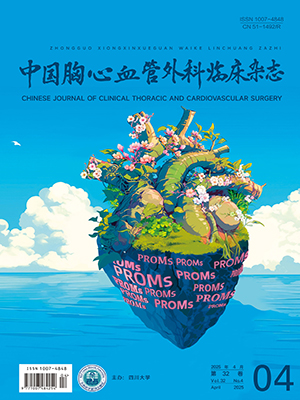| 1. |
Galal MO, Wobst A, Halees Z, et al. Peri-operative complications following surgical closure of atrial septal defect type Ⅱ in 232 patients-a baseline study. Eur Heart J, 1994, 15(10):1381-1384.
|
| 2. |
高伟, 周爱卿, 余志庆, 等.儿童继发孔型房间隔缺损的介入治疗.中华儿科杂志, 2004, 42(4):287-290.
|
| 3. |
马周瑞, 杨应南, 李亚雄, 等.中老年继发孔型房间隔缺损的外科治疗.中国胸心血管外科临床杂志, 2009, 16(3):229-231.
|
| 4. |
韩林, 郝家骅, 张宝仁, 等. 40岁以上继发孔型房间隔缺损手术治疗经验.中华胸心血管外科杂志, 2000, 16(1):13-15.
|
| 5. |
Butera G, Carminati M, Chessa M, et al. Percutaneous versus surg-ical closure of secundum atrial septal defect:comparison of early results and complications. Am Heart J, 2006, 151(1):228-234.
|
| 6. |
李巅远, 闫军, 李守军, 等.三种不同微创技术与经典外科技术治疗房间隔缺损的临床对比研究.中国胸心血管外科临床杂志, 2009, 16(1):31-35.
|
| 7. |
Messent M, Sullivan K, Keogh BF, et al. Adult respiratory distress syndrome following cardiopulmonary bypass:incidence and prediction. Anaesthesia, 1992, 47(3):267-268.
|
| 8. |
Wan S, Leclerc JL, Vincent JL. Inflammatory response to cardiopu-lmonary bypass:mechanisms involved and possible therapeutic strategies. Chest, 1997, 112(3):676-692.
|
| 9. |
Tanita T, Song C, Kubo H, et al. Superoxide anion mediates pulmonary vascular permeability caused by neutrophils in cardiopulmonary bypass. Surg Today, 1999, 29(8):755-761.
|
| 10. |
Gu Yj, Boonstra PW, Graaff R, et al. Pressure drop, shear stress, and activation of leukocytes during cardiopulmonary bypass:a comparison between hollow fiber and flat sheet membrane oxygenators.Artif Organs, 2000, 24(1):43-48.
|
| 11. |
刘罡, 杜德禄, 李延军.左旋精氨酸对小儿先天性室间隔缺损手术体外循环中肺的保护作用.中华实用儿科临床杂志, 2013, 28(11):876-877.
|
| 12. |
Shah D, Azhar M, Oakley CM, et al. Natural history of secundum atrial septal defect in adults after medical or surgical treatment:a historical prospective study. Br Heart J, 1994, 71(3):224-228.
|
| 13. |
Konstantinides S, Geibel A, Olschewski M, et al. A comparison of surgical and medical therapy for atrial septal defect in adults. N Engl J Med, 1995, 333(8):469-473.
|
| 14. |
Campbell M. Natural history of atrial septal defect. Br Heart J, 1970, 32(6):820-826.
|
| 15. |
Yalonetsky S, Lorber A. Comparative changes of pulmonary artery pressure values and tricuspid valve regurgitation following transcatheter atrial septal defect closure in adults and the elderly. Congenit Heart Dis, 2009, 4(1):17-20.
|
| 16. |
Wu ET, Akagi T, Taniguchi M, et al. Differences in right and left ventricular remodeling after transcatheter closure of atrial septal defect among adults. Catheter Cardiovasc Interv, 2007, 69(6):866-871.
|
| 17. |
Santoro G, Pascotto M, Sarubbi B, et al. Early electrical and geome-tric changes after percutaneous closure of large atrial septal defect. Am J Cardiol, 2004, 93(7):876-880.
|
| 18. |
Ağaç MT, Akyüz AR, Acar Z, et al. Evaluation of right ventricular function in early period following transcatheter closure of atrial septal defect. Echocardiography, 2012, 29(3):358-362.
|
| 19. |
Pascotto M, Santoro G, Cerrato F, et al. Time-course of cardiac remodeling following transcatheter closure of atrial septal defect. Int J Cardiol, 2006, 112(3):348-352.
|
| 20. |
陈寄梅, 庄建, 张镜方, 等.儿童期心脏瓣膜成形术.中国胸心血管外科临床杂志, 2004, 11(1):29-31.
|
| 21. |
柳克晔, 来永强, 罗志强, 等. "缘对缘"瓣膜成形术在先天性心脏病合并重度三尖瓣关闭不全中的应用.中华胸心血管外科杂志, 2010, 26(6):371-373.
|




